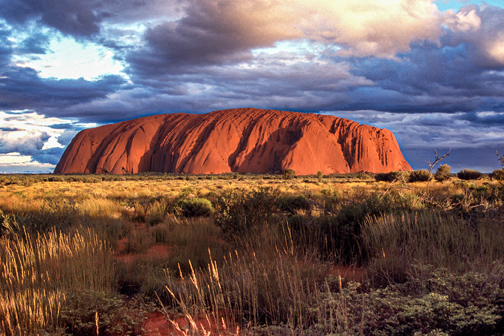
The heatwave reaches top temperatures
N 22°33'06,3" E 145°44'50.5"
Day: 200 Stage three / total expedition days 591
Sunrise:
05:23
Sunset:
18:48
As the crow flies:
20,2
Daily kilometers:
31
Total kilometers:
6025 km
Temperature - Day (maximum):
45° degrees, sun approx. 70°
Temperature - Night:
17.7° degrees
Latitude:
22°33'06,3"
Longitude:
145°44'50.5"
Dead tree camp – 02.12.2002
The thick dust that a passing road train stirred up an hour ago is only slowly clearing. “We’re lucky to be here on a track with hardly any traffic,” I say, striding towards the rising sun. “That’s right, because there’s no breeze, the dust mist hangs in the air forever,” Tanja replies. The sun is casting its rays through the burnt forest. The morning landscape looks spooky. In addition to the never-ending drought, this area has also suffered from a massive bushfire. “We burned out overnight,” Ashley reported yesterday. A neighbor tried to burn down a piece of scrubland during the wrong season to gain more grazing land for his cattle. Within just a few minutes, the fire got out of control and completely burned down all the surrounding stations. “It was hopeless to fight the sea of flames. Even from a distance of 20 kilometers, we could hear the roar and crackling of the flames,” said Ashley.
I look at the dead tree corpses stretching their carcasses into the blue sky and am glad not to have been walking here at the time of the bushfire. “You should have dropped everything to save your bare skin,” Ashley’s words run through my head. Despite the rising temperatures, a shiver runs down my spine. This station has also become a victim of the drought. It seems to me that our expedition is jumping from floe to floe to overcome this deadly catastrophe.
On the way we meet the owners of The Lake Station who invite us to stay. “Unfortunately, we have to keep going. We want to reach the coast before the end of the year,” we decline with thanks. Around 11:00 a.m. we find a small dam built by the station people. It is only a quarter full. We scurry our animals down, tie Rufus to a half-dried tree and drag 33 buckets to our thirsty boys. An hour later, we walk on, exhausted from the hard work. The temperatures are indescribable. My electronic thermometer is no longer usable. The display has gone black due to the insane heat. The mercury column on our other thermometer climbs to 68° degrees. “Can that be true?” I ask Tanja. “You mean it also suffered a heat shock?” “I don’t know, but 68° degrees at this time of day is hard to believe. “I believe it,” Tanja replies, wiping the sweat from her face.
Shortly after 12:00 we reach a cattle grid. Cursing, I realize that there is no goal. I am forced to remove the wires from the posts with my pliers. The metal is so hot that I burn my hands. It takes 20 minutes until we finally leave this obstacle behind us. We leave the track and now walk across an area that was cleared years ago. We zigzag our way through the maze of tree trunks until we find a place to camp under a few gidyeas.
We languish in the shade of the protective film at 45° degrees. These are the hottest temperatures during our entire expedition. I take off my wet, sweaty shirt and drink a vegetable broth from Rapunzel. Funnily enough, the hot drink feels good despite the heat. Hundreds of flies immediately settle on my bare arms and upper body. I’m too tired to chase them away and let them be. It doesn’t take long for me to get used to the constant tickling. I keep nodding off during my navigation work and short recordings. Tanja is no different. However, as she is responsible for herding camels, she has to leave the protective shadows from time to time.
At around 1:00 a.m., strong gusts of wind wake me up. At the moment the temperature rises from 23° to 30° degrees and the humidity is enormous. It feels as if the air is permeated with water. I immediately start sweating profusely and the sleeping bag gets clammy. Is this a sign of a drastic change in the weather?

